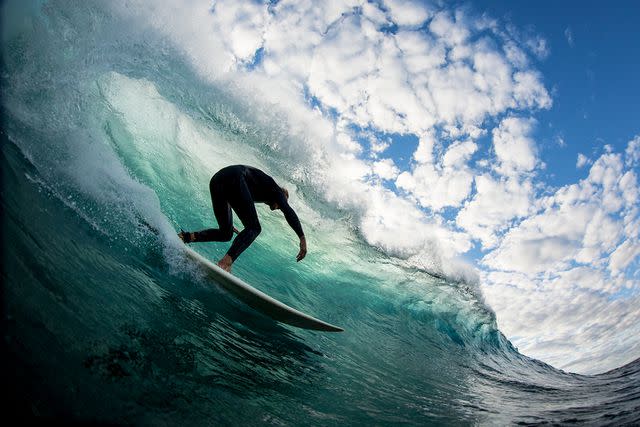How to Prevent a Shark Attack and What to Do If Bitten? An American Lifeguard Association Expert Weighs In
Plus, shark attack survivor Paul de Gelder — who's hosted 20 documentaries for Discovery Channel’s Shark Week — debunks common misconceptions about the fish

Getty
As famously quoted in Finding Nemo, "Fish are friends."
However, it may be hard to generalize that statement in the wake of the numerous shark attacks that have tragically occurred to date, with a reported 54 victims in 2023 alone as of Aug. 2.
The Florida Museum of Natural History’s International Shark Attack File investigated 108 alleged shark-human interactions worldwide in 2022, confirming 57 unprovoked shark bites on humans and 32 provoked bites.
The aforementioned statistics, unfortunately, have heightened concern among beachgoers and often misconstrue the public's perception of the triangular-toothed, pointed-fin fish.
But Shark Week presenter Paul de Gelder — an Australian Army veteran and shark attack survivor, who lost two limbs while diving for the Navy in 2009 — encourages the public to "read between the lines," telling PEOPLE that the media tends to sensationalize when it comes to sharks attacks.
"When the media starts talking about 'an explosion in shark attacks' or 'there's a big rise in shark attacks,' we're talking like three or four ... or maximum 10," de Gelder explains. "Florida had 30,000 road fatalities in the first quarter of this year. That's a substantial number."
"Gun deaths, heart disease or people driving around their phones, that's what you should be worried about," he continues. "Sharks, they're so far down on the scale, it's almost absurd to be thinking about it."
Related: Shark Week Started 35 Years Ago and the Reason Why May Surprise Animal Lovers (Exclusive)
While de Gelder acknowledges that shark attacks are unfortunate incidents, he stresses that the ocean "is a wild place" and "not your backyard swimming pool." Therefore, he says "it needs to be respected as such."
In addition to research and education to better understand sharks, there are precautions ocean lovers can take before entering the water. Plus, there are several tips to keep in mind should one encounter the often-feared fish while already swimming in the ocean.
Wyatt Werneth — a lifeguard of 28 years and a public service spokesperson for the American Lifeguard Association — is also sharing his expertise in an effort to encourage others to embrace the ocean, while offering tips to reduce anxiety caused by sharks.
"They don't want to attack in the sense of a serial killer or a murderer," Werneth — who's currently based in Cocoa Beach, Florida — tells PEOPLE.
"They are feeding ... Attack is a strong word," he says, comparing sharks to humans eating hamburgers. "If someone put their hand in there and we bit them, we didn't attack them. They stuck their hand in when we were biting the hamburger."
To learn more about ways to prevent a shark attack and what to do if already bit, scroll on for Werneth and de Gelder's advice.
Swim in the ocean near lifeguards

Getty
The safest thing for beachgoers to do if they want to swim is do so in front of lifeguards. Not only is it a safe move should you get swept up in a rip current, but guards are educated in sea life identification, so they're trained to actively scan the water for unusual activity.
"If you're in an area where there are lifeguards, ask questions," Werneth tells PEOPLE. "We have these boards that we write daily things to pay attention to, like currents. We'd also write on there, 'Sharks have been sighted.'"
Werneth also notes that most lifeguards have flag systems that alert swimmers to clear the water.
Do research on the area if there are no lifeguards present

Michael M. Santiago/Getty
If you want to swim at a beach where there are no lifeguards present, Werneth doesn't discourage it — in fact, he "wants to encourage people not to be afraid of the water." However, he stresses the importance of researching and educating yourself on the local conditions before swimming.
"How are people talking about [the area]? What are fishermen seeing and doing? You want to look around and do your education on that," explains Werneth.
De Gelder points to the Internet as the best resource. "We can actually search and find out if there's been shark bites or shark interactions in recent history where we're going," he tells PEOPLE. "We can find out if there's a migratory pattern of fish that the sharks might be following."
Avoid swimming during the hours of dawn and dusk

Getty
While it's nice to go for a sunrise or sunset dip in the ocean, Werneth suggests avoiding swimming during the hours of dawn and dusk — or at least in waters where sharks are known to frequent, due to their feeding hours.
"I will also survey the water," says Werneth. "I'm in tune with what's happening, what's moving, what time of year the sharks are migrating. If the waters are calm after a turbulent day and the birds are dropping in and fishing and there's a lot of activity in the water. I'll watch that and stay cautious."
However, de Gelder notes that those hours are only true to an extent. "Sharks aren't particularly hunting in the morning. They're hunting all the time," he says.
Werneth also advises avoiding swimming near fishermen because "they're pretty much baiting the water and enticing every type of fish, including sharks, to come bite their line" — not to mention the potential hazards of running into their lines, alone.
Natural environments, like jetties or rocky areas, are other areas to proceed with caution. "Jetties are where a lot of fish like to nest up and sharks will go there to find them," he says.
But if "it's a perfect storm of things," de Gelder says it might be best to avoid swimming in that zone. "If it's low light levels, it's murky water, there's someone fishing near you, or there's trawlers going past, dragging fish back into the docks, maybe you want to steer away from those areas," the expert adds.
Avoid swimming immediately after stormy conditions

Getty
To further capitalize on the water surveillance point, Werneth says to proceed with caution after "there's a bit of choppy, turbulence water or good surf." He explains that rough conditions cause a stir up beneath the sea, making it difficult for sharks to feed.
When the water calms down and turns to glassy conditions, "everything in the ocean's feeding." Therefore, Werneth says he doesn't allow swimmers to reenter the water for "a little bit longer in those situations," like roughly an hour.
Be aware of your surroundings in the water

Getty
Once you enter the ocean, Werneth says it's important to "be very aware of your surroundings" and "be in tune with the water." But he stresses to do so in a non-paranoid way.
"Just know the vibe," he says. "If fish start jumping around, there could be something chasing these fish. They're scared, they're nervous. Get out of the water."
"If someone around you starts yelling shark or whatever, obviously get out of the water," Werneth continues. "But be comfortable and enjoy your experience while in the water... You don't have constantly looking for a shark."
Never swim in the ocean alone

JIM MCKINLEY/Getty
Sharks aside, Werneth emphasizes the importance of never swimming alone. But on the topic of sharks, he says having a buddy is always advisable, just in case something happens.
However, swimming in a crowd isn't necessarily a shark deterrent. Werneth says "a lot more activity and noise" could potentially "make it more interesting" for them.
"But again, let's go back to enjoying the ocean," he stresses. "I don't think we have to go into the water saying, 'Let's deter sharks all day!'"
Avoid wearing jewelry in the ocean
Aside from the risk of losing your jewelry in the ocean, Werneth says its shine could potentially attract sharks and other fish, as they're often drawn to flashy objects in the water.
In part, that's why fisherman use a lure when fishing! "That lure is flashing what they're catching," he explains. "If you have flashy stuff on in the water, you're more likely to get bit by something."
Look for two fins when identifying a shark

Getty
There's a prominent distinction when identifying sharks in comparison to other sea life in the ocean, especially since other fish can have a similar appearance in the waves. For example, a ray's wing or a dolphin's dorsal could look like a shark fin when sticking out of the water.
Werneth says sharks often "present two fins... their tail fin and their little dorsal fin that's going through the water." The way sharks move is another way to identify them. "It's more of a sweeping fluid motion," he explains, in comparison to a dolphins that often bob up and down.
If you're in the water and spot a shark, stay calm

Getty
If you happen to be in the water and think you see a shark, Werneth says to remain calm, even though that may be difficult. "The most important thing is to know that they're not there to attack you," he stresses.
"They're cruising through because they're looking for something — and like a fisherman, want to be in the right place where the fish might be," he says. In fact, Werneth recalled a time his daughter encountered a shark when she was swimming in the ocean.
"She was trapped between the shore and the shark was in between her and the beach," he explains. "And she just stayed calm and we stood right there and I was prepared to do whatever needed to be done. Just cool. The shark went away and she calmly came in."
If you are being attacked, 'fight like hell'

Getty
In the extremely rare scenario you find yourself being attacked by a shark, Werneth says there are ways to take action if you're able to do so. Specifically, "fight like hell" and do "anything to get it to know you're not an easy prey," he says.
Punching the shark in its nose or poking it in its eyes are advised; however, Werneth notes it's important you don't swing "anywhere near the teeth line" since they are razor sharp. "People have hit the shark in the mouth and gotten cut on the hand," he says.
Werneth also says to "punch them in the gills" if the shark is attacking you. This will irritate their breathing, and hopefully cause them to release and swim away.
Now if you're bit and "still got the fight in you," Werneth says "to put direct pressure on the bleeding, get out of the water, put a tourniquet on it and call 911" if a lifeguard isn't already on the scene. "Get EMS rolling or get to the hospital as soon as possible."
He continues, "Your biggest concern is having an artery ruptured or bleeding out. So, you want to get direct pressure or tourniquet on above the wound."
In de Gelder's scenario, he tells PEOPLE that he "did try to fight back" the shark, but "there was really nothing I could do," he says. "I saw it attached to my leg and I tried to go for the eyeball, but I actually had my right hand in its mouth at the same time."
De Gelder says if it's waist-deep water, you "might have to lunge at the shark," then punch it or jab it in the eyeball — but above all, he says the "best thing you can do is try and remain calm and slowly move out of the water while not taking your vision off the shark."
If you see a shark swimming, don't try to fight it
If you aren't being attacked by the shark, don't attack it! "As with all wild animals, we don't recommend trying to fight or punch or jab it in the eyeball," de Gelder stresses.
"You don't punch a barking dog in the nose because it's going to bite you," he said in comparison to a shark that is curious and coming towards you. "You don't act aggressive towards it because when you act aggressive towards a wild animal, it may end up acting aggressive towards you."
De Gelder adds, "You just got to remain calm and show it that you're a big, bad predator, too."
For more People news, make sure to sign up for our newsletter!
Read the original article on People.

